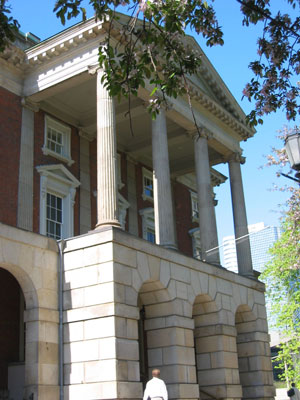Toronto lawyer Julie Amourgis has inched her way back from the brink of the profession, as a Law Society of Upper Canada hearing panel has removed practice restrictions that stemmed from her disbarment in 1987.

“Thanks to all the people who helped me though this,” Amourgis tells Law Times. “And to the law society for believing in me.”
Amourgis says few lawyers truly understand the fallout triggered by disbarment.
“It’s not just that you’re not able to practisce your profession anymore and have to look elsewhere,” she says, noting she had been a lawyer for 15 years - essentially her whole adult life - before being disbarred. “It’s who you are.”
She says people “looked at me like I was a thief, and I was never that kind of person. I was Miss Goody Two-Sshoes beforehand. It didn’t make any sense to the community at large, and so they just thought I was off the wall when I told them - it wasn’t right. So there was the disbelief there.”
Amourgis says she also had to deal with a diminished credit rating caused by the disbarment, and struggle to establish a new career.
“Refocusing to work in a new field was difficult,” she says, crediting help from family and friends for getting her on track with that.
“It was very different and I guess one always has the feeling that people are looking at the bump on your nose,” she says. “It may not be true, but that’s the feeling one has. In other words, they always can see through you. So it was a really difficult position I found myself in.”
Amourgis was disbarred in 1987 for concealing the fact that her husband at the time and former law partner, Constantine, was still practising. He had been disbarred in 1982 for misappropriating over $213,000 from various clients, along with 33 other professional misconduct charges.
Witnesses at a 1999 LSUC hearing - which led to Amourgis’ readmission to the profession under restrictions - described the husband as a “manipulative, domineering man with no moral compass.” He also was called “charismatic and charming.”
A hearing panel report issued to Convocation at that time indicated Amourgis said she was “in terror” of her husband, and that she was afraid of losing her children and having them turn against her.
The 1999 panel report said, “What kept Mrs. Amourgis married to such a difficult person was and is her belief that for the sake of the children it is better to have two parents.”
The 1987 panel that disbarred Amourgis found that she had employed Constantine following his own disbarment. Specifically, it said she had allowed him to counsel her client to falsify an insurance claim, and found her guilty of various other counts of professional misconduct, such as failing to return deposit money and breaching escrow conditions.
Following her disbarment, Amourgis became a real estate agent and worked as a supply teacher, and for the first time got her own bank account and learned to manage her own money, according to the 1999 hearing panel report. Her husband had up to then dealt with her finances. She also built her own support network, it said.
The 1999 panel ruled that Amourgis, who was 57 years old at the time, had “purged her guilt and that her present character is unimpeachable.”
Then-bencher Susan Elliott, who headed that hearing panel, said Amourgis was “a person who has recovered from a series of tragic life events and has made her mark as a worthwhile, productive member of society.”
That panel reinstated Amourgis, pending a set of restrictions such as getting permission from the law society before moving her practice and working only in the areas of family law and litigation.
A law society hearing panel, led by chairwoman bBencher Linda Rothstein, last month lifted those restrictions last month, with a few conditions.
Amourgis must ensure that a practice review is conducted on her operation within six months, and must implement any recommendations. A subsequent practice review must be conducted to make sure she has followed the recommendations. She must pay for the cost of both reviews.
“This is a remarkable success story,” says lawyer William Trudell, who represented Amourgis. “This was a woman who established her own network and strengths, and that was recognized by the law society. It was very hard for a woman, actually, to go through this kind of a hearing and be successful and start again in litigation and develop the respect that she has.”
Adds Trudell, “A lot of people would have given up, but she showed great courage, and so actually, if I can take my lawyer’s hat off, I’m really proud of her. She really built herself up again and is really respected in the industry.”
Trudell says the removal of the asterisk next to Amourgis’ name in the LSUC’s lawyer directory was long overdue.
“For a very successful and experienced litigator, she’s a very shy person,” he says. “I don’t think that she’s able to recognize the respect that she has and probably won’t celebrate enough.”
Amourgis says she battled to return to the profession because it’s where she belongs.
“It was the best fit for me,” she says. “I liked the work and thought that people responded to the help I gave them as a lawyer more than in any other field that I had done. This was, I thought, a good fit for them and for me. It’s where I could be most helpful to the community.”

 “Thanks to all the people who helped me though this,” Amourgis tells Law Times. “And to the law society for believing in me.”
“Thanks to all the people who helped me though this,” Amourgis tells Law Times. “And to the law society for believing in me.”